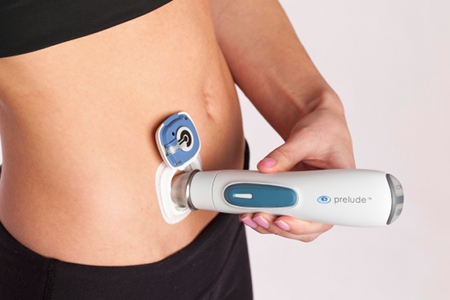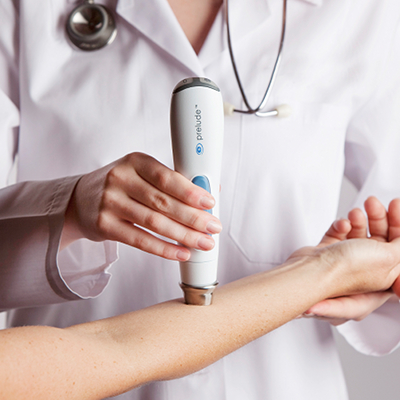The electric car, the mobile phone, the computer tablet: innovations impress me. I tend to give nature's perfect patterns top priority; however, in this field I am also increasingly illuminated by science, and when an advance is presented -- almost as if revealed by Star Trek's caring and compassionate Dr. Leonard H. "Bones" McCoy himself -- I take notice.
Such an advance was recently presented to me in the form of Echo Therapeutics' Symphony glucose monitoring system. Since expanding numbers of people using awkward, painful and soon-to-be-antiquated methods of glucose monitoring may benefit from this convenient technical stride forward, I spoke with Dr. Pat Mooney, who appears on The Doctors on CBS this week, and who represents the company behind this impressive (and impressively humane!) medical innovation.

Dr. Pat Mooney
"We're still in an advanced-prototype stage," explains Dr. Mooney when I ask him about the device's development. "We're locking it down. The original device came out of M.I.T., Dr. Robert Langer's labs. If you Google him, you'll see how prolific he is. What he did is he invented this original ultrasound device which permeates the skin, so you can deliver drugs without a needle, or you can extract analytes. Really it's a skin-permeation platform that allows a portal into the body without the use of a needle or taking drugs orally."
Now that really sounds Star Trek. I ask how Dr. Mooney's next-generation step works, and I am answered. Essentially, the company's electronic Prelude device uses microdermabrasion to reach the precise junction of dry outer skin and the moist live skin beneath. A microprocessor sends a physically-undetectable electrical current of millionths of an ampere into the skin, thus measuring current flow. When this current hits the outer layer of dead skin (which the doctor describes as both container and barrier composed of organic "bricks and mortar"), the impendence is measured, sending a signal to the Prelude's rotating laser-cut tip to remove only the top of the epidermis in a very small area (about the size of a dime), allowing for painless readings at the live-skin level as well as permeation. Healthy skin quickly regenerates the top layer, so the window for localized use is currently around 24 hours, although ideally the Echo Therepeutics company is aiming for 48 and possibly longer.

Prelude and Symphony. (Hottie not included.)
Since diabetes is reaching pandemic proportions, Dr. Mooney notes that 25 million Americans currently struggle with the disease, but of those only about a fraction suffer from Type 1, or hereditary, diabetes (the inability to produce insulin). He chalks up the remainder who develop Type 2 -- insulin-resistant -- to firm failures in human health practices: 1. Poor diet (way too many processed or "fast" foods and foods of excessive calories and/or low nutritional value), and 2. Poor physical lifestyle (way too sedentary, put simply).
Relatedly, last year I attended an excellent event for the L.A. literary outreach group WriteGirl, attended by the likes of Sarah Silverman, Paul Dooley and many luminous young ladies of letters. Multi-hyphenate creative person Nia Vardolos (of the wonderful My Big Fat Greek Wedding) was there looking terrific, and somebody asked her how she keeps so fit. "Eat-less-move-around-more!" she replied, sans pause. There you go.
For those who do contend with diabetes, Echo Therapeutics offers hope of much easier, painless and needle-free glucose monitoring. The Prelude device preps the skin, and then the pioneering Symphony device attaches via a finger-bandage-type adhesive to read levels continuously. Echo Therapeutics will provide a presentation on June 8 at the American Diabetes Association's Scientific Sessions, which run from June 8-12 in Philadelphia.
Dr. Mooney elaborates: "It's a huge leap forward. The model on diabetes, historically, has been that you prick your finger. You get a drop of blood, you put that on a strip, and then you put that glucose testing strip into a glucometer -- a glucose meter -- and it tells you what your blood-sugar level is at a particular point in time. It's not particularly pleasant to prick your finger; you've got a lot of nerve-endings in your finger, so it hurts. But more than that, the American Diabetes Association recommends that you check your blood-sugar level by pricking your finger four to six times a day. That's not nearly enough information.
"Think of it this way: If you check your blood sugar levels four times a day, and you check them at midnight when you go to bed, dawn when you wake up for breakfast..." -- thus far this is an alien schedule to this writer, but carry on -- "... you check it at lunch at noon, then again at dinnertime, you're only checking it four times, and it could be normal all the times you check it. But you don't know what your blood sugar is doing at 1 o'clock in the morning, 2, 3, 4 p.m. while you're asleep." (Actually, I'm trying to recall the last time I was asleep at 3 a.m.)
"It's those uncontrolled, unknown highs or lows that lead to the long-term complications of the disease," continues Dr. Mooney, citing blindness, kidney, and vascular disease. More frequent glucose testing is obviously a step toward a solution, and other companies are heading in that direction (with needle-based readings sent to a belt sensor in five-minute intervals), but he believes that Echo Therapeutics, despite their modest size, is taking a major step in continuous monitoring.

Echo Therpeutics aims for discreet and convenient use.
The Symphony bio-sensor, which is displayed in action (notably on perhaps the hottest diabetic ever; hey, whatever gets your message across!) in the YouTube clip linked below, offers much more convenient and comfortable monitoring. "Generally speaking, you'll wear it on your torso, your abdomen or your thorax. You could wear it on your shoulder. It's discreet and nobody sees it. And that way it can connect wirelessly, and transmit your glucose levels, every minute, to a wireless remote monitor." And by this, Dr. Mooney means that users can even bluetooth it to their smartphone. Hello future, how's it going?
"This is a very big step forward for patient care, in diabetes," Dr. Mooney concludes. And yet I'd like to know more. With glucose monitoring as a first step for this great new product, what about drug delivery and other medical applications?
"Yes, that's the blue sky," replies Dr. Mooney in a cool, doctor-innovator kind of parlance. Being of artistic temperament, I immediately muse upon Cole Porter, but the good doctor's follow up is technical and confident. "We've licensed the rights to our Prelude skin-prep system to a company that makes a drug called Lidocaine (an anesthetic). And Lidocaine is generally given by a cream or by needle. And the needles hurt, people don't like to use needles, but the problem is that because you have this outer layer of skin, like bricks and mortar, it takes about a half hour to an hour before you get numb. One of our partners did a study which showed that in less than five minutes you could get very effective numbing when you permeate the skin with your Prelude device. So we're not particularly focused on that right now -- with 30 employees, you can imagine we're limited in what we can do -- and we're zealously focused on glucose monitoring right now.
"The blue sky, the future of the story, is drug delivery: There's going to be a lot of drugs for which we'll be able to enhance the delivery. That's where we're very different from a lot of companies that are in the diabetes space: We're focused on diabetes initially, but this is a platform technology which will allow us to do many, many things."
Echo Therapeutics short demo clip
For more by Gregory Weinkauf, click here.
For more on diabetes, click here.